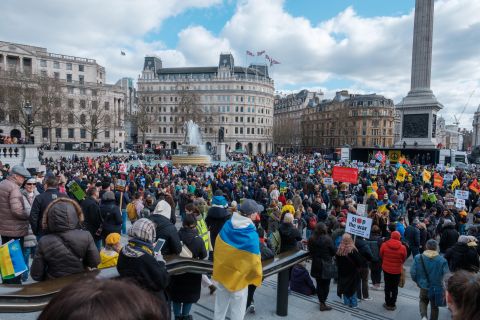
The War in Ukraine - The Consumer Voice
The impact of the war in Ukraine is front of mind. The March 2022 Ipsos Issues Index reveals a huge jump in public concern about defence and foreign affairs, following the Russian invasion. And 7 in 10 are expecting businesses to speak out.
But are words enough?
GWI reports that 60% of consumers feel that brands/companies must do the right thing morally. Many are using social media to hold businesses accountable and calls to boycott brands such as McDonalds and Coca-Cola gained traction until they took meaningful action in Russia. GWI note this is “very different to what we saw in the aftermath of the Black Lives Matter protests in 2020”. Even in the relatively small time frame they believe “times have changed and this is a very different crisis.”
It is clear that corporate statements and impactless shows of solidarity aren’t enough anymore. When asked specifically about the situation in Ukraine, GWI found that 26% of consumers had stopped buying from a brand that is not supporting Ukraine’s cause.” (PR Weekly).
But with the cost of living rising, price will continue to be a major factor in the purchasing decision for a large majority of consumers.
"While Britons support new sanctions against Russia, the cost of living is already soaring in the UK. When faced with the choice, Britons are hesitant to sanction Russia if it means accepting further price increases" (YouGov).
We asked 3 consumers about the response from big brands and how the crisis has affected their purchasing decisions.
Clare Hesketh: "Where sanctions can have real impact I fully support the British companies that are taking a stand against Russia. Personally, I was supporting the boycott of brands such as Coca Cola and KFC until they followed the lead of other businesses taking a stand. But it shouldn't take celebrities and social media campaigns to provoke this action"
Paul Stiles: “I believe that companies have a responsibility to do everything they can to help the situation. I’d like to think I buy based on but this is an ever changing situation and sometimes it’s hard to keep up with who is doing what. I don’t always trust the media’s reporting either”
Lily Thompson: “I do care about what companies are doing in response to Ukraine, but I can’t afford not to choose the cheapest options at the moment”.
And here lies the problem. Whilst consumers may wish to vote with their wallets they may not always have the luxury of choice. And whilst consumers may say they purchase one way, does that really translate to their actual decisions?
At The Good Business Festival last week this so-called “Say-Do Gap” phenomenon was raised in the context of consumer decisions. The discussion concluded that although true consumer activists are making decisions based on company action now, what people say is just as, if not more, important. Their beliefs provide insight into future change and can provide opportunities to build long lasting brand loyalty.
Dr Carol McNaughton Nicholl from Britain Thinks agrees, “It’s these contradictions that point towards areas of opportunity, where people are saying they want to do something, but are unable to do so”
Our consumers may differ on their current purchasing decisions for a range of reasons but what they all agree on is what they want from big brands. To act fast. To be authentic. To have real impact.